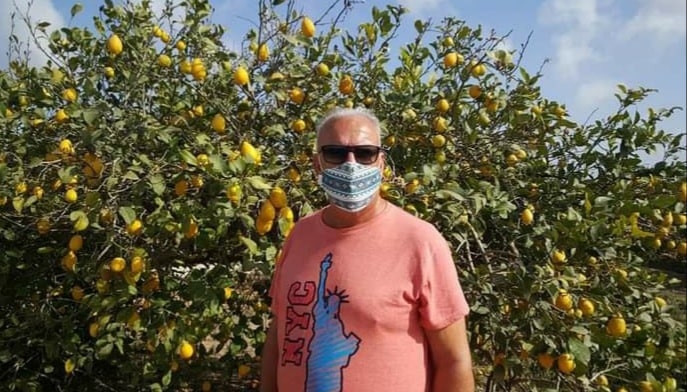By Andrew Atkinson
Tens of thousands of lemons are being left to rot in the Vega Baja – highlighted by the paltry sum offered of 0.03cents a KILO!
This week ONE lemon purchased in Lancashire cost 63p. Enter Los Montesinos a Vega Baja town and witness the lemon groves aplenty that remains to be gathered, due to not being cost effective, with labour crops costing in the region of €5-€8 to be picked.
The farming industry has been hit following the closure of the hostelry industry in Spain during the last year, due to the coronavirus pandemic.
ASAJA-Alicante has approached the Consell for direct aid, along with tax exemptions for the agricultural sector.
Young Farmers ASAJA-Alicante has been vociferous in the crisis lemon farmers are facing in the provinces of Alicante.
Sales of lemons has almost ceased from mid-November, due to the lockdown measures.
The Fino variety campaign is amid minimal contracts for what is deemed a ‘Periodic price’, at below production costs, deemed a violation of the Food Chain Law and Decree 5/2020 of the Ministry of Agriculture.
Lemon farmers face thousands of euros losses in the current climate of Alicante agriculture, echoing that of the Gota Fria/DANA in 2019.
Despite this desperate situation, lemons need to be picked to enable new shoots/blossoms for future crops.
ASAJA-Alicante said: “The campaign began to slow down in mid-November 2020, when the restrictions and confinements to try to contain the advance of the pandemic started.
“It seemed that operations had reactivated after the passage of storm Filomena and the cold arrived. However, this only lasted a few days.
“In mid-January, the HORECA sector was closed in many parts of Spain and Europe, and the sale and purchase operations of the Fino variety were practically paralysed.
“The few operations there have been were carried out with contracts below production costs, thereby violating the Food Chain Law.
“We are facing a ruinous campaign for two reasons. On the one hand, the closure of the HORECA sector since mid-January has meant that there is little demand for citrus fruit, as bars, restaurants, and hotels account for 40% of the demand.
“Prices are below production costs based on information from the Murcia Ministry of Agriculture and the Interprofessional Association of Lemon and Grapefruit (AILIMPO),” said vice president of ASAJA-Alicante, Jose Vicente Andreu.
“The lemon campaign has been devastating and the lemon fields in the Vega Baja region offer a daunting scenario. Farmers are plucking the fruit and throwing it to the ground – because it’s not worth selling it – and they need to remove the citrus from the tree so that it can sprout for the next harvest,” said ASAJA-Alicante.
Lemon production in Spain has seen low sales and the Unió de Llauradors (Growers Association) has stated of citrus fruits in Alicante, especially lemons.
José Manuel Pamies, head of the Association’s citrus department in Alicante, said: “The current campaign is marked by the low number of marketing transactions. The lack of rainfall and the high temperatures in recent months prevented lemons from reaching the desired calibres, until it started raining, and everything has been delayed.
“There is neither harvest nor export, since, apparently, the market still has sufficient stocks.
“Right now there’s a lot of Fino, which this year has overlapped with another early variety that has been delayed, and not everything can be shipped at once.
“As a result, growers are nervous and worried because many tonnes of lemons have accumulated, sales are still low, and the few transactions carried out are done at really low prices – it’s not worth it.”
José Manuel Pamies added: “We are going through a difficult time, but it is important not to despair and wait and see how the market will react after the holidays.
“Spanish growers’ position of disadvantage compared to Turkey. This is a country with a high rate of lemon consumption, but which does not produce enough to supply its entire population and cover the demand from tourism during the spring and summer.
“For this reason, they usually purchase Spanish lemons. The problem is that they set really high import tariffs, of 54%, which increases our costs to an enormous extent.
“Furthermore, the Turkish government subsidises lemon growers covertly with about $120 per tonne, making it very difficult to compete.
“Given this situation, La Unió has issued many complaints to the European Union, urging it to seek a solution, but we have never received an answer about it.
“The Unió considers it necessary for the EU to intervene and put an end to the advantages Turkey enjoys. Meanwhile, lemons have also been left out of the aid programme for product withdrawal, introduced because of the Russian veto, which has entailed numerous problems for Alicante’s growers.”
Spain is internationally known for its citrus, of which 260 million tonnes are harvested in Valencia, and more than 90% in Alicante, with 12,000 hectares in the Vega Baja alone.
This is an essential product as approximately 12,000 families depend on the crop, both directly and indirectly.
Photo shows Reporter Andrew Atkinson amongst the lemons in Los Montesinos.






